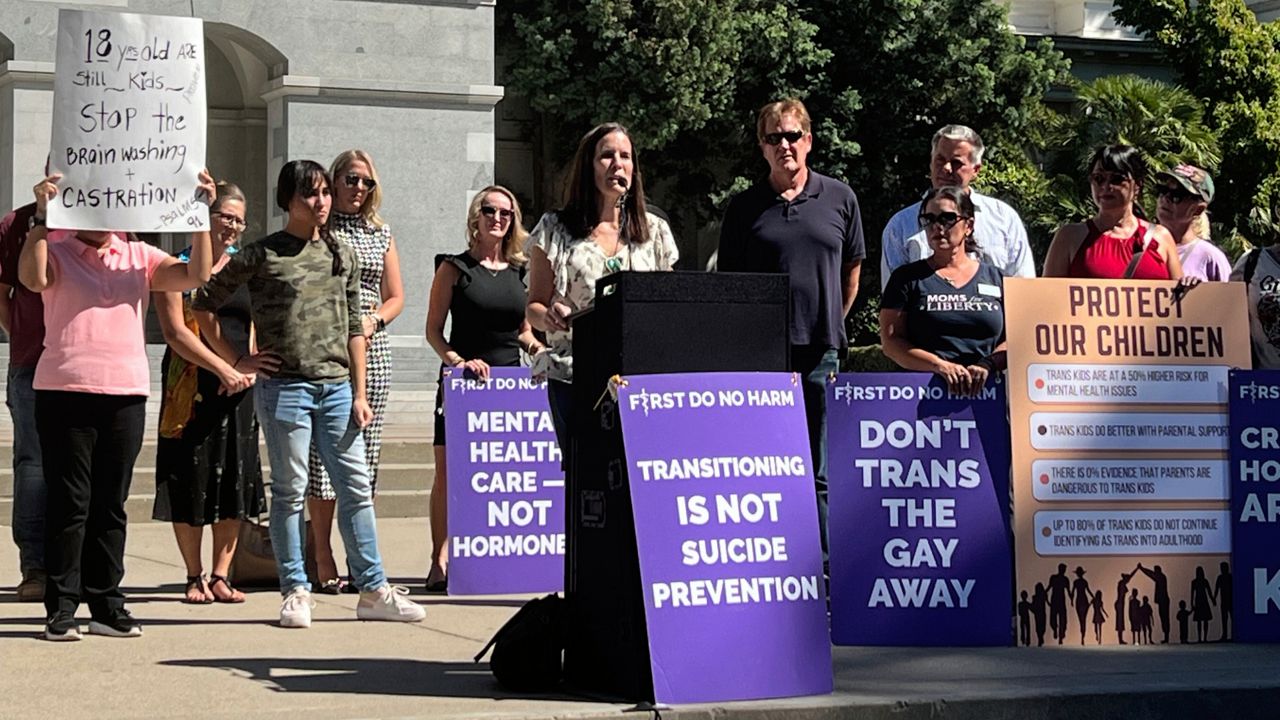
SACRAMENTO, Calif. — A California judge has tentatively sided with state Attorney General Rob Bonta in a dispute over the title of a proposed ballot measure that would require school staff to notify parents if their child asks to change gender identification at schools.
A group backing the measure sued Bonta over the language he released, arguing it was biased and misleading. Bonta titled the measure the “Restrict Rights of Transgender Youth” initiative, but backers want it changed to the “Protect Kids of California Act.” They also want the summary updated.
What You Need To Know
- Bonta titled the measure the “Restrict Rights of Transgender Youth” initiative, but backers want it changed to the “Protect Kids of California Act”
- Backers want it changed to the “Protect Kids of California Act”
- They also want the summary updated
- Sacramento Superior Court Judge Stephen Acquisto indicated he may deny their request, saying the attorney general’s description of the proposal is accurate
But Sacramento Superior Court Judge Stephen Acquisto indicated he may deny their request, saying the attorney general’s description of the proposal is accurate.
“Under current law, minor students have express statutory rights with respect to their gender identity,” Acquisto wrote in his tentative ruling. “A substantial portion of the proposed measure is dedicated to eliminating or restricting these statutory rights.”
Acquisto said he would give the matter further thought before issuing a final decision. At a hearing in Sacramento on Friday, lawyers debated whether the word “restrict” was a fair representation of what the proposed measure would do.
“Currently, students can make requests for gender identity accommodations and receive those accommodations freely,” Deputy Attorney General Malcolm Brudigam said. “After the measure, that can’t happen without parental notification.”
But Erin Friday, a lawyer and proponent of the measure, said the language should be changed to use a more impartial word, such as “limit,” and noted that initiatives with a title and summary that include the word “restrict” often fail.
The title and summary Bonta released indicate that the measure violates the rights of students, but “parents have rights above all others to constitute care and education of their children,” she said.
The proposed initiative would also ban transgender girls in grades 7 through college from participating in girls’ and women’s sports, along with barring gender-affirming surgeries for minors, with some exceptions.
It is part of a nationwide debate over local school districts and the rights of parents and LGBTQ+ students. States across the country have sought to impose bans on gender-affirming care, bar trans athletes from girls and women’s sports, and require schools to “out” trans and nonbinary students to their parents. Some lawmakers in other states have introduced bills in their legislatures with broad language requiring that parents be notified of any changes to their child’s emotional health or well-being.
The proposed ballot measure in California has so far received at least a quarter of the more than 500,000 signatures it needs by May 28 to end up on the ballot in November, according to the secretary of state’s office. But backers of the measure say the title and summary Bonta released for the proposal are hindering their ability to garner enough support before time runs out. They want the secretary of state to extend their deadline by 180 days.
They want to remove language released by Bonta’s office that says the initiative would bar gender-affirming care for transgender youth “even if parents consent or treatment is medically recommended” and require schools to notify parents of their child’s request to be treated as a gender different from school records “without exception for student safety.” They also want the summary to say the measure would define “male” and “female.”
California citizens can place initiatives on the ballot if they gather enough supporting signatures, but the attorney general is typically responsible for writing the title and summary language that appears before voters. California judges can step in if they rule the attorney general is not using impartial language. In recent years, California judges have ordered the state to correct misleading information about proposals to repeal a gas tax and raise taxes on business properties.
Ballot measure summary language released by the attorney general can have a “huge impact” on how people vote, said Bob Stern, former president of the Center for Governmental Studies.
“For some people, that’s the only time that they’ll see any information about the measure — is when they go in to vote,” Stern said.
Stern believes the nonpartisan Legislative Analyst’s Office, not the attorney general, should release ballot measure summaries, because attorney generals are elected officials who often have a future in politics. Bonta, for example, is expected to run for governor in 2026.
Bonta is currently fighting a Southern California school district in court over a policy that, in part, required school staff to notify parents if their child asked to change their gender identification at school. Bonta said the policy discriminated against gender non-conforming students. The district, Chino Valley Unified, updated the rule last month to remove mention of gender identification changes. The updated rule is more broad, requiring school staff to notify parents if a child requests any changes to their “official or unofficial records.”
Kathie Moehlig, head of San Diego-based nonprofit TransFamily Support Services, said the proposed ballot measure and similar proposals at the school district level have left children she works with scared that “their very being is going to be legislated out of existence.”
“Schools don’t have an agenda to make kids trans. Schools have an agenda to keep all students safe.” Moehlig said. “The unfortunate truth is that there are some kids who are in homes where sharing about their gender identity or sexual orientation would make them unsafe.”



